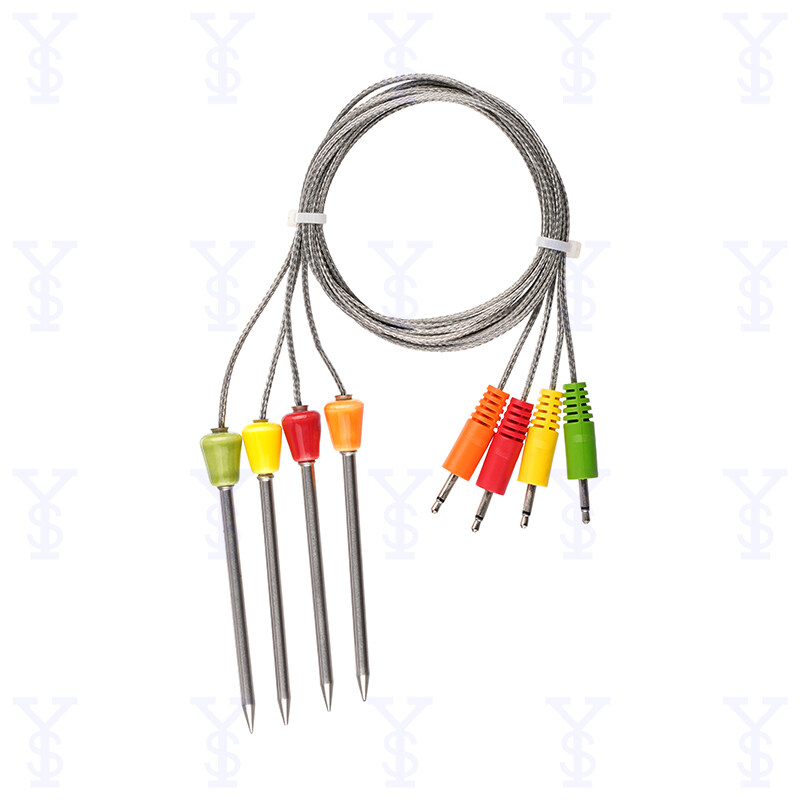Электрондук почта форматында ката
emailCannotEmpty
emailDoesExist
pwdLetterLimtTip
inconsistentPwd
pwdLetterLimtTip
inconsistentPwd


The Comprehensive Guide to NTC Probe Sensors: Understanding Their Role and Applications
NTC probe sensors are a critical component in many modern temperature measurement systems. Whether used in industrial settings, consumer electronics, or home appliances, these sensors offer precise and reliable temperature readings. This guide will delve into the fundamentals of NTC probe sensors, their applications, and why they are a preferred choice for temperature sensing.
What is an NTC Probe Sensor?
NTC stands for Negative Temperature Coefficient. An NTC probe sensor is a type of thermistor, a resistor whose resistance varies with temperature. The "negative" in NTC indicates that the resistance decreases as the temperature increases. This characteristic makes NTC probe sensors ideal for accurately measuring temperature changes in various environments.
How NTC Probe Sensors Work
NTC probe sensors work by utilizing materials with specific resistance properties. As the temperature around the sensor changes, the material's resistance changes correspondingly. The sensor's electronic circuitry measures this resistance change, which is then converted into a temperature reading.
Why NTC Probe Sensors Are Widely Used
One of the main reasons for the widespread use is their high sensitivity and accuracy. They can detect even minor temperature fluctuations, making them suitable for applications that require precise temperature control. Additionally, the sensors are cost-effective and have a long operational lifespan, which further enhances their appeal.
Key Applications of NTC Probe Sensors
The sensors are versatile and can be found in numerous applications across various industries. Here are some of the most common uses:
1. Home Appliances
The sensors are commonly used in home appliances such as refrigerators, ovens, and air conditioners. In refrigerators, they help maintain the desired internal temperature, ensuring that food remains fresh. In ovens, they regulate the cooking temperature, contributing to evenly cooked meals. Air conditioners use the sensors to monitor and adjust the room temperature, providing a comfortable environment.
2. Medical Devices
Temperature monitoring is crucial in medical devices such as incubators, ventilators, and patient monitoring systems. The sensors provide the accuracy and reliability needed to ensure that these devices function correctly, maintaining patient safety and comfort.
3. Automotive Industry
In the automotive industry, the sensors are used to monitor engine temperatures, ensuring that engines operate within safe temperature ranges. They are also employed in climate control systems to regulate cabin temperatures, enhancing passenger comfort.
4. Industrial Applications
The sensors are essential in industrial processes that require precise temperature control, such as chemical processing, food production, and manufacturing. These sensors help maintain optimal temperatures, ensuring product quality and safety.
5. Consumer Electronics
The sensors are found in various consumer electronics, including smartphones, laptops, and wearable devices. They help manage the heat generated by electronic components, preventing overheating and extending the lifespan of these devices.
6. BBQ Grills
Interestingly, the sensors are also used in BBQ grills. A bbq ntc temperature sensor helps monitor the grill's temperature, ensuring that food is cooked at the right heat level. This application showcases the sensor's versatility and ability to function in various environments.
The Advantages of Using NTC Probe Sensors
The sensors offer several advantages that make them the preferred choice for temperature sensing in many applications.
1. High Accuracy
The sensors are known for their high accuracy in temperature measurement. They can detect small temperature changes, making them suitable for applications where precision is critical.
2. Fast Response Time
The materials used allow them to respond quickly to temperature changes. This fast response time is essential in applications where temperature fluctuations occur rapidly.
3. Durability and Longevity
The sensors are built to withstand harsh environments, making them durable and long-lasting. Their robust construction ensures they can operate effectively in challenging conditions, such as extreme temperatures or high humidity.
4. Cost-Effectiveness
Compared to other temperature sensing technologies, the sensors are relatively inexpensive. Their cost-effectiveness, combined with their high performance, makes them an attractive option for many industries.
5. Compact Size
The compact size allows them to be easily integrated into various devices and systems. Their small footprint makes them ideal for applications with limited space.
How to Choose the Right NTC Probe Sensor
Selecting the right sensor for your application involves considering several factors. Here are some key considerations:
1. Temperature Range
Different sensors are designed to operate within specific temperature ranges. Ensure that the sensor you choose can handle the temperatures in your application.
2. Accuracy Requirements
Consider the level of accuracy required for your application. Some sensors offer higher accuracy than others, which may be necessary for critical temperature measurements.
3. Environmental Conditions
Assess the environmental conditions in which the sensor will operate. If the sensor will be exposed to moisture, chemicals, or extreme temperatures, choose a sensor that can withstand these conditions.
4. Response Time
In applications where temperature changes rapidly, select the sensor with a fast response time. This will ensure that the sensor can accurately track temperature fluctuations.
5. Compatibility with Existing Systems
Ensure that the sensor is compatible with your existing systems and devices. This includes checking the sensor's electrical specifications and connection type.
Installation and Maintenance of NTC Probe Sensors
Proper installation and maintenance are crucial for ensuring the longevity and accuracy of NTC probe sensors.
Installation Tips
- Positioning: Place the sensor in a location where it can accurately measure the temperature without being affected by external factors such as drafts or direct sunlight.
- Secure Mounting: Ensure that the sensor is securely mounted to prevent movement or vibrations that could affect the readings.
- Proper Wiring: Follow the manufacturer's guidelines for wiring the sensor to avoid electrical interference or damage.
Maintenance Guidelines
- Regular Calibration: Periodically calibrate the sensor to maintain its accuracy.
Calibration intervals will depend on the application and environmental conditions.
- Inspection: Regularly inspect the sensor for signs of wear, damage, or corrosion. Replace the sensor if any issues are detected.
- Cleaning: Keep the sensor clean, especially if it is exposed to dirt, dust, or chemicals. Use appropriate cleaning methods recommended by the manufacturer.
Future Trends in NTC Probe Sensors
As technology advances, NTC probe sensors continue to evolve, offering even more capabilities and applications. Here are some trends to watch for in the future:
1. Integration with IoT
The sensors are increasingly being integrated with the Internet of Things (IoT). This integration allows for real-time temperature monitoring and data analysis, enabling more efficient and automated systems.
2. Improved Materials
Advancements in materials science are leading to the development with enhanced performance characteristics. These new materials may offer better accuracy, faster response times, and greater durability.
3. Miniaturization
The trend toward miniaturization continues, with the sensors becoming even smaller. This miniaturization opens up new possibilities for their use in compact and portable devices.
4. Enhanced Connectivity
Improved connectivity options, such as wireless communication, are being incorporated into the sensors. This feature allows for easier integration into complex systems and remote monitoring capabilities.
Conclusion
NTC probe sensors are indispensable in today's world, playing a vital role in temperature measurement across various industries. Their high accuracy, durability, and cost-effectiveness make them the go-to choice for many applications. As technology continues to advance, the sensors will likely become even more versatile and integrated into the fabric of modern life.
Whether you're working with home appliances, medical devices, or industrial systems, understanding the capabilities and advantages is crucial. By selecting the right sensor and ensuring proper installation and maintenance, you can achieve precise and reliable temperature measurements, contributing to the success of your application.

